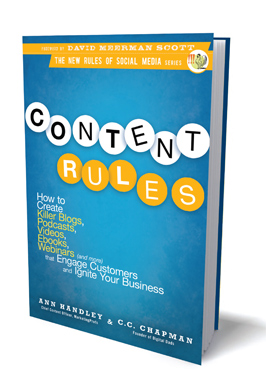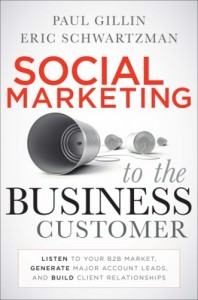I had the pleasure recently of reading two books by people I know. Two *more* social media books by people I know quite well.
So, how am I supposed to do an objective review?
I’m not.
How am I supposed to drum up enthusiasm for social media books when it’s probably much healthier to step away from my day job once in a while?
I’ll wear my fatigue on my sleeve and still recommend the books.
First of all, the two books in question:
 Content Rules, by Ann Handley and C.C. Chapman, and;
Content Rules, by Ann Handley and C.C. Chapman, and;
Social Marketing to the Business Customer, by Paul Gillin and Eric Schwartzman.
(Oh right, disclosure- I was given copies of each book with no obligation, though I am prone to buy these types of books on occasion as well if the mood strikes and I just-just-just-just-juuuuuuust got paid).
I’ll just say now: go buy and read these books if you are interested in online content strategy or social media for the business-to-business (B2B) world- or more importantly need information on either of these subjects to make the case for such at your company, because these folks know what they are talking about. Simple enough for a review?
 I’m not going to critique writing styles or nitpick about content, though both books are full of anecdotes, case studies (especially in the case of Social Marketing…) and practical advice (more the province of Content Rules). I’m also not going to get into the tired “I’m not the audience for these books” – that’s part of what the “fatigue” is about. You not the audience as well? Then give the books away to someone who could use them (yeah, I should do that).
I’m not going to critique writing styles or nitpick about content, though both books are full of anecdotes, case studies (especially in the case of Social Marketing…) and practical advice (more the province of Content Rules). I’m also not going to get into the tired “I’m not the audience for these books” – that’s part of what the “fatigue” is about. You not the audience as well? Then give the books away to someone who could use them (yeah, I should do that).
The main reason I don’t want to get into picking apart writing styles is I don’t want to go down the road of reviews like this and get into a pissing match where authors are defensive and.. well who cares, anyway?
By the way, if you choose these books for writing that sings, you are probably reading the wrong kind of books- but I will recommend a couple of fairly recent books where the writing flowed really well for me: Six Pixels of Separation by Mitch Joel, and Twitterville by Shel Israel, who I found to be an excellent storyteller (yeah, I know those guys a little too- occupational hazard).
The real value of Content Rules and Social Marketing… to me is that they represent a positive, evolutionary move to more niche oriented books, rather than “Social Media is Good” books of the first wave (Groundswell, Join the Conversation and yes, Six Pixels…).
Both books hit specific concepts within online social media – content and B2B, natch – and therein lies their usefulness. Both books also manage to future-proof themselves to the point that is possible in this industry, meaning they rely heavily on ideas and strategies rather than tools (Content probably had the tougher line to toe in that regard). The disadvantage is that practical advice can be blunted by generality, while the advantage is that it prevents a book from being obsolete not long after it hits the shelves (an example might be- though I hope I’m wrong – Steve Garfield’s Get Seen, a wealth of practical information for creating videos, but so laden with equipment, software and website recommendations that the first edition is probably already out-of-date).
You Could Have Just Skipped to This Part
So what value can I bring writing about these books other than pimping out and linkbaiting my friends? I think these books (and others) are better enjoyed by exploring the wealth of dynamic online content that these authors are creating on a weekly, even daily basis. You cannot judge books without knowing where the authors come by their subjects, and you certainly can’t judge the review without knowing the reviewer’s point of view.
In fact, I would go further to say dip into the authors’ current online content and root around as you use the books- it tells you more about where they come from, and where their thinking may have evolved since publication.
First, Content Rules; this book would have no authority if both authors were not knee-deep in content.
I knew of Ann Handley dating back to her days at ClickZ, and now through the amazing marketing content she oversees at MarketingProfs. She also occasionally (that is, not often enough) commits a more personal style of writing on her personal blog, Annarchy.
C.C. Chapman, for his part, adds to the book’s ideas, deliberately and otherwise, through a variety of podcasts, video and written posts. Home base is http://www.cc-chapman.com/, but definitely have a poke around the Digital Dads content.
For Social Marketing to the Business Customer:
Paul Gillin writes a regular column in BtoB Magazine, and has built credibility on years in the industry based on leading roles at Computerworld and TechTarget. Also, he often uses his blog at http://gillin.com as a workshop to test-drive chapters of upcoming books, and take in comments and contributions from others. What is a social media book without collaboration?
Eric Schwartzman I first got to know through his podcast, On the Record Online. Each episode is an in-depth interview with communications professionals and journalists, a rich backlog of material that of course informed much of Eric’s contribution to the book.
My point, put briefly: bring life to any of these books by incorporating the living content that feeds them. They may be dead tree books, but you don’t have to read them that way.
Will I be reading the bunch of new social media books coming out? Maybe, I don’t know. The next issue of MOJO Magazine is on its way, though, and my bedtime reading is reserved for the next several nights.

I too have a great deal of respect for Ann and CC. I’ve been thinking about getting content rules.
Would you say these books are good for professionals at a specific level of expertise?
I’m always a bit hesitant to dig into the “concept” focused books. They can be great for inspiring ideas, but if they’re too vague I end up with nothing to actually implement. Would you say these books still have a good amount of actionable insight?
Appreciate you taking the time to share your thoughts.
I would say like most other books in this genre, they aren’t for an especially advanced audience. The B2B book speaks a bit more to the business side of things and might help some of us too used to B2C examples. Content Rules is more general.
That’s where the fatigue comes from, not to mention the conflict between supporting friends and kneejerk reactions to all things “social media”
Great read Doug. Content Rules is a great read and indeed an even better read is enjoyed by following the two authors over time. Love this take.
Doug: Thanks for a fair and honest review. I think you got the essence of what we’re trying to do, which is to deliver practical and actionable advice rather than speculation about Where It’s All Going. I’m especially pleased to be reviewed in the company of Content Rules, which is an excellent book.
Social media books have transitioned from big picture to defined value, and that’s a good thing. We’re all pretty comfortable with the idea of social media at this point, so it’s time to talk about how we can put it to work in real-world scenarios.
I appreciate the link to Jay Dolan’s Anti-Social Media review of The Now Revolution. I don’t see much to be accomplished by writing a hostile review. I rarely finish books that I hate, anyway. The best way to let them pass into obscurity is simply to ignore them. I’m glad you didn’t ignore ours.
Paul, Thanks.
I only pointed to Jay’s review as an example of something I just don’t have time to get into– I might actually agree with language nitpicks and some attention to grammar, but it’s not necessarily the first thing to stand between me an enjoyment of a book.